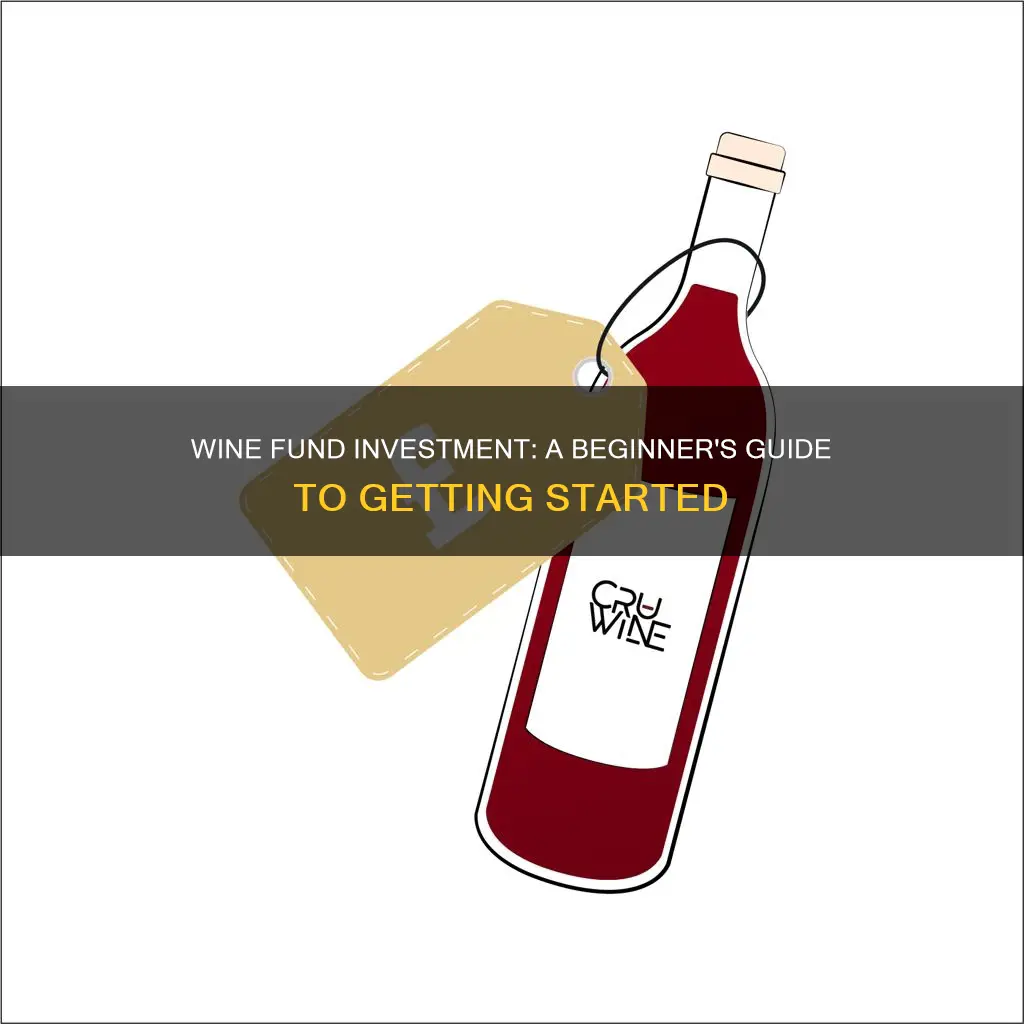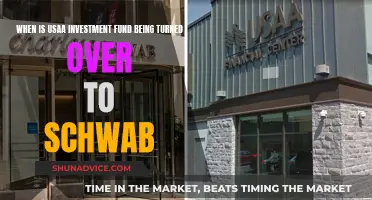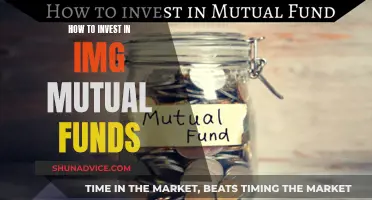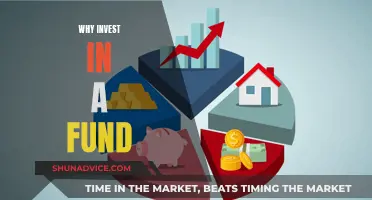
Wine is an alternative investment that can diversify your portfolio. Wine's value is based on factors such as weather patterns, harvest yields, vintage, and consumer trends, which are unrelated to the performance of the stock market. This means that wine investments can complement traditional portfolios. Wine also experiences lower market volatility and may preserve value during market contractions or recessions.
There are several ways to invest in wine, including buying, storing, and selling individual bottles, investing in stocks of companies in the wine industry, or working with a service that manages, stores, and insures a wine collection. However, investing in wine can be costly, and there are risks associated with breakage, damage, or improper storage.
What You'll Learn

Wine funds and wine futures
Wine futures, or en primeur in French, refer to the practice of buying wine from the producer while it is still in the barrel, typically two to three years before it is bottled and released. This method of buying wine is most commonly associated with the Bordeaux region of France but is also used for wines from Burgundy, California, the Rhone Valley, Italy, and Port. En primeur is usually only available to industry insiders, but some companies are starting to offer this opportunity to retail investors.
The benefits of buying wine en primeur include the potential for greater returns, as the wine is less expensive at this stage, and the ability to obtain wines that may become more difficult to access once bottled. For example, the Bordeaux 2000 vintage was highly profitable for en primeur investors, as the wines were in great demand but initially priced too low. However, as with all forms of derivatives, wine futures are considered a more complex investment type best left to experienced traders.
When considering investing in wine futures, it is essential to research the producer's history, vintages, and other fundamentals. Vintage variation can significantly impact the quality and value of the wine, so investors should pay close attention to vintage reports and industry expert assessments of each year's crop. While buying wine futures can be a prudent investment practice, there are inherent risks, and prices can fluctuate or decline over time.
Investing in Mutual Funds for Minors: A Step-by-Step Guide
You may want to see also

The pros and cons of investing in wine
Pros
- Wine offers a unique source of diversification for your portfolio because its value is based on factors unrelated to the performance of the economy, interest rates, corporate earnings or conventional investor sentiment.
- Wine experiences lower market volatility than stocks and other traditional assets.
- Wine can help you manage portfolio risk.
- Wine may preserve value during market contractions or recessions.
- Wine has tangible value as a beverage and a physical collectible.
- Wine is recession-resistant.
Cons
- Wine can be extremely expensive to buy and store, creating a barrier to entry for some investors.
- Wine investors must deal with additional costs that traditional investments don't have, such as shipping, storage, and insurance.
- Wine has a long holding period, which may not suit investors with a shorter time horizon.
- Wine is difficult to store, requiring a carefully controlled environment.
- There is a risk of counterfeit wine, especially if not bought from a reputable source.
- Wine is an illiquid asset, which may decrease in value if converted to cash quickly.
Diversification: A Key Advantage of Mutual Fund Investments
You may want to see also

How to research current and future wine values
Vintage
The year in which the grapes are harvested and the wine is produced in a particular region is known as the vintage. The quality of the harvest varies from year to year, with weather conditions having the most significant impact on the grapes. A well-informed investor should be aware of the vintages that yield the best production of the wine under consideration.
Wine Producer's Reputation
The reputation of a wine producer has a big impact on a wine's potential for appreciation. Many of the most investable wines come from leading producers, such as Domaine de la Romanee-Conti (DRC), Petrus, Chateau Mouton Rothschild and Chateau Lafite Rothschild, as well as from regions such as Burgundy and Bordeaux.
Aging Potential and Longevity
Aging potential is critical for fine wine because some wines age better than others. Factors that can influence the potential to age well include the type of grape and the level of acid and tannins. You can also look at a producer's track record of creating wines that age well.
Scarcity and Price History
Wine scarcity drives up the value of the vintages you invest in. Take, for example, Domaine de la Romanee-Conti, a vineyard known for some of the world's most sought-after Burgundy wines. However, because of its small size, it produces only around 450 cases annually.
Wine Critics
The recommendations of wine critics are taken very seriously, and critic ratings can have a strong impact on a wine's potential to appreciate. Robert Parker, James Suckling and Jancis Robinson are among the most influential wine critics, so be sure to assess their published opinions on wines you're considering.
Subject Matter Expertise
Wine is an extremely complex asset, and it takes knowledge and preparation to become a successful investor. It is critical to educate yourself about the market, define your tastes and the style of wine that interests you, as well as your aspirations, time horizon and return objectives.
Consumer Behaviour
Consumer behaviour is a critical factor in understanding wine preferences, consumption patterns and selections. This includes personal factors such as wine knowledge, environmental orientation, experience, enjoyment, cognitive dimensions, involvement, habits, preferences, brand familiarity, consumption frequency and purchase frequency.
Market Dynamics
Changing market dynamics can favour wineries that embrace adaptation. For example, direct-to-consumer volume and value sales were lower in 2023, and tasting room visitation dropped for the second straight year. However, strong 2023 holiday sales should improve the outlook for both.
Apollo Fund: A Guide to Investing Wisely
You may want to see also

The impact of state regulations
State regulations can have a significant impact on investing in wine, particularly when it comes to purchasing and storage options. Here are some key ways in which state regulations can affect your wine investment strategy:
- Purchasing restrictions: Some states have laws that prohibit the purchase of wine over the internet, directly from wineries, or through retailers that don't go through a wholesaler. These restrictions limit the selection of wines available to collectors and investors, as the choices are dictated by what wholesalers carry.
- Storage considerations: Depending on your location, you may need to invest in a wine cooler to maintain optimal temperature and humidity levels for your collection. In areas with unsuitable conditions for wine storage, the cost of a wine cooler can run into the thousands. Additionally, consider the electricity costs associated with running a wine cooler, as it will impact your overall investment budget.
- Insurance coverage: Expensive wines are often considered valuable items, similar to jewellery. Depending on the value of your collection, you may need to explore specialised wine insurance policies, as standard home or contents insurance may not provide sufficient coverage. Discuss your options with your insurance company, and be sure to understand the deductible, coverage amount, and policy cost.
- Compliance with local laws: When investing in wine, it's crucial to comply with local laws and regulations. This includes understanding any specific regulations related to the sale of alcohol to individuals from another country. Consult with legal experts or advisors to ensure that your wine investment activities adhere to all applicable laws.
- Tax implications: Tax regulations for wine investments can vary by jurisdiction. For example, in the United States, profits from selling wine are subject to capital gains taxes, while in the United Kingdom, wine classified as a "wasting asset" is exempt from capital gains tax. Consider consulting a financial advisor or tax specialist to navigate the tax implications of your wine investments.
Explore Mutual Funds for Your Defence Sector Investment
You may want to see also

How to store wine
Storing wine is a critical aspect of investing in wine. The environment, conditions, and even the position of the wine bottle can impact the quality and value of the wine. Here are some essential tips on how to store wine properly:
- Temperature Control: Wine should be stored at a consistent temperature, ideally around 12°C to 13°C (54°F to 55°F). Wine is sensitive to heat, which can alter its flavour and cause oxidation problems if the seal is damaged. A consistent wine storage temperature can help maintain or increase its value. Consider using a wine fridge for easy temperature control.
- Humidity: Your wine storage area should maintain a relative humidity of between 50% and 70% to prevent the cork from drying out. Humidity also helps protect the integrity of the wine label and capsule, which is important to collectors. If you can't achieve this humidity range, consider storing your wine in a professional wine storage facility.
- Light Exposure: Excessive light and UV exposure can increase the temperature of the storage area and damage the bottles. Keep your wine storage area dark as much as possible. Only turn on the lights briefly when necessary, and avoid using UV or artificial lights.
- Bottle Position: Wine bottles should be stored on their side to maintain contact between the cork and the wine, keeping the cork moist. There are various creative storage options to keep bottles on their sides, such as free-standing racks or wall mounts.
- Storage Location: The reason many people store wine in a cellar is that it typically provides a dark and cool environment. If you don't have a cellar, consider investing in a wine fridge or converting a dark closet into a wine storage area.
- Wooden Boxes: If your wine came in a wooden box, you can keep it there as long as the temperature is consistent. The wooden box will not negatively impact the wine.
- Long-Term Storage: If you plan to store your wine for an extended period (5-10 years or more), maintaining ideal conditions is crucial to protect its value and allow it to develop properly over time. Consider adding a wine cellar or investing in professional wine storage.
- Storage Facilities: If you don't have suitable storage conditions at home, consider renting space at a local wine locker or storage facility. These facilities provide climate-controlled warehouses specifically designed for storing fine wines at the ideal temperature and humidity. They also offer additional services like expert maintenance and 24/7 security for your wine collection.
- Insurance: Consider insuring your wine collection, especially if you plan to store it for a long time. Power outages or other emergencies can impact the condition of your wine. Some storage facilities offer insurance services to guarantee the pristine condition of your wine investments.
- Private Storage: Another option is to rent storage space from another wine collector. This method can be more affordable, and a fellow collector may be willing to store individual bottles. However, it may not offer the same security and assurance as professional storage facilities.
Real Estate Fund Investment: A Beginner's Guide to Success
You may want to see also
Frequently asked questions
Wine is an alternative investment that can help diversify a portfolio. Wine investments perform better in times of crisis than most other investments. Wine offers a unique source of diversification because its value is based on factors unrelated to the performance of the economy, interest rates, corporate earnings or conventional investor sentiment.
Wine investments tend to be medium- to long-term. One of the biggest risks is damaging the bottles, which can nullify their value. As with all investments, there is no guarantee that the value of any specific bottle of wine will increase.
The best indicators of a wine’s current and future values are ratings and scarcity. Wine critics rate wines on a scale of 1 to 100. Wines that rate around 95 are considered high quality. Scarcity is harder to predict. A wine currently in limited production is a good indicator.
It can take at least $15,000 to $25,000 to begin building a portfolio of fine wines. Fixed costs are high, so a substantial investment is necessary to achieve economies of scale.
Some companies that can help you invest in wine include Cult Wines, Rare Wine Invest, Vint and Vinovest.







